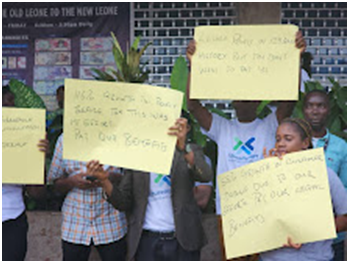By Amin Kef (Ranger)
Standard Chartered Bank former employees on Thursday, 12th October, 2023 staged a protest before the bank headquarters demanding their terminal benefits.
Fifty-One (51) former employees of Standard Chartered Bank are seeking compensation and benefits following the termination of their employment contracts in a case titled: “Felix Berethe & 51 Others vs. Standard Chartered Bank Sierra Leone Limited”.
During a former legal proceeding, on October 6th, 2023, the High Court of Sierra Leone, presided over by Justice Hannah Bonnie, ordered the bank to make a payment of NLE 124,018,730.55, equivalent to $5,536,550.47 to the affected former employees within a seven-day timeframe.
However, in a new twist, Standard Chartered Bank is seeking before, Justice Jamesina King, of the Industrial and Social Security Division of the High Court of Sierra Leone leave to appeal the said order in the matter which was adjourned to Wednesday 18th October for further hearing.
Justice Jamesina King is now dealing with the consequential legal battle which is at the crossroads of labour rights and banking regulations.
This contentious case arose from the Employment Act No. 15 of 2023 and Convention 095 – Protection of Wages Convention, 1949 and has captured the attention of legal and financial experts nationwide.
The former bank employees are represented by the legal team at Lambert & Partners in the High Court in Sierra Leone through an application filed on October 11, 2023.
The case, which is framed within the framework of the Employment Act No. 15 of 2023 and Convention 095 – Protection of Wages Convention, 1949 (No. 95) also invokes the International Covenant on Economic, Social, and Cultural Rights and is grounded in Order 5 Rule 4 of the High Court Rules 2007, Constitutional Instrument No. 8 of 2007.
It must be reiterated that the High Court’s October 6, 2023 decision ordered Standard Chartered Bank Sierra Leone Limited to disburse a significant sum of Le124, 018,730.55, equivalent to USD5, 536,550.47, alongside an additional 10% of that amount.
The funds were mandated to be held in an escrow account at the Sierra Leone Commercial Bank Limited, with disbursement subject to the court’s further approval. The approval is to be determined before the bank’s sale, divestiture processes or the recognition of new owners by the Central Bank of Sierra Leone or any other regulatory body.
However, an instruction was given to legal representatives to pursue leave to appeal the decision at the Court of Appeal and aims to address several critical concerns.
Firstly, the plaintiffs argue that the court’s decision prematurely presumes their right to redundancy compensation and end-of-service benefits without due consideration of relevant contractual agreements, legal provisions, collective agreements, or statutes. They contend that the decision could set a precedent, allowing courts to unilaterally define the terms of employment contracts for supervisory-level bank employees, potentially impacting the broader banking industry in Sierra Leone.
Moreover, it is believed that the sums ordered for the escrow account are excessive, unreasonable and lacking a contractual, legal or statutory foundation. They argue that these funds could be disbursed without a stay of execution, presenting a significant risk of irretrievable loss.
This impending legal battle is anticipated not only to address the concerns of the 51 former employees but also to set a momentous legal precedent that could reshape employment contracts and compensation within the Sierra Leonean banking sector.
The Defendants (Standard Chartered Bank) have appealed the ruling and are steadfast in their stance, asserting that their appeal has strong prospects of success, and that this legal challenge represents a landmark case with far-reaching implications for Sierra Leone’s labor landscape.
The defendant/applicant (Standard Chartered Bank) is now petitioning for a stay of execution of this order while concurrently seeking permission to appeal the ruling to the Court of Appeal. They contend that the court’s decision constitutes a premature judgment on compensation and benefits issues, lacks support in any contracts or statutes, and could establish a precedent affecting employment agreements across the banking sector.
The defendant/applicant (Standard Charted Bank) has also expressed concerns that without a stay of execution, the funds held in the escrow account may be released to the plaintiffs/respondents, potentially rendering the bank unable to recover these amounts if their appeal proves successful.
Ransford Johnson, a Barrister and Solicitor representing the defendant/applicant, has submitted an affidavit in support of the notice of motion, emphasizing the strong likelihood of success for their appeal in the Court of Appeal.
Nonetheless, the former Standard Chartered Bank Sierra Leone employees remain resolute in their pursuit of justice and have brought their grievances to the highest court in the land, invoking various legal instruments and regulations to present their case.
This case underscores the importance of legal safeguards for both employees and employers in the country and highlights the need for meticulous examination of employment termination and compensation matters, especially within the banking industry.




